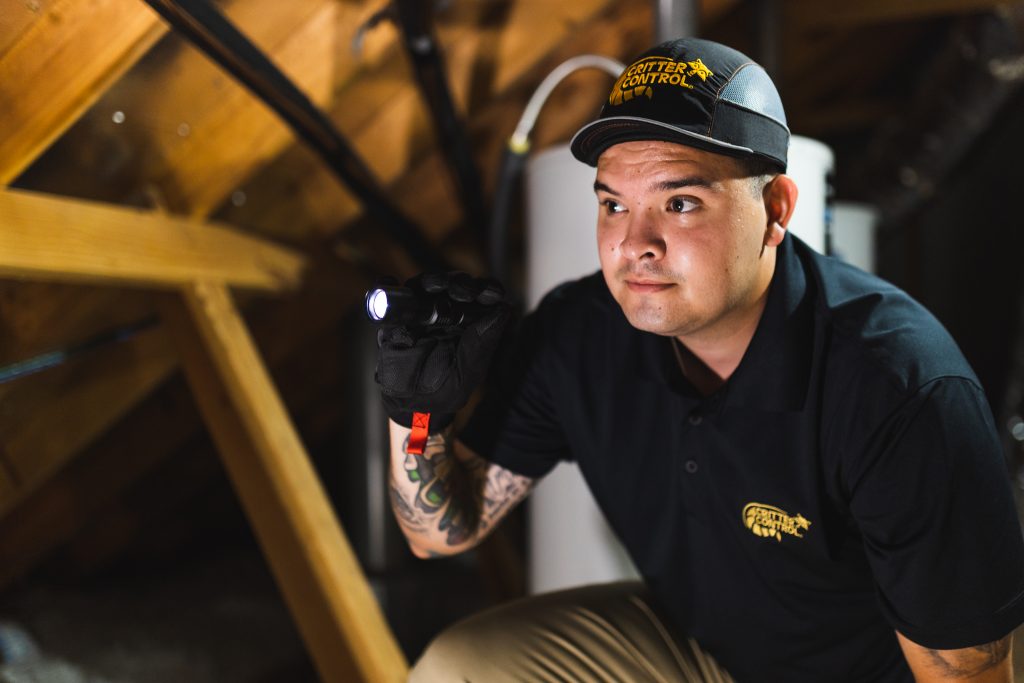The most common complaint related to animals in the attic is the noise. Animals make noises in the attic and inside walls by moving around, creating nests, and storing food. Also, critters like raccoons, birds, and squirrels can be very vocal. People will hear crying, screeching, screaming, and hissing when an animal is the attic.
What you hear at night or early in the morning can help us positively identify the nuisance wildlife living inside your house. Animal identification is our first step in the humane wildlife removal process.
What Noises Do Animals Make in Your Attic?
It is unnerving knowing that a wild animal could be lurking nearby, but the worst part is not knowing what animal is making the noise. Even worse, how many of them are there, and what damage are they causing?
The Most Common Animal in the Attic Noises
- Scratching or scurrying
- Thumping
- Fluttering and Flapping
- Gnawing
- Rolling or Dragging
- Chirping
- Squeaking
- Crying
- Whining
- Mewing
What Animal is Causing This Noise?
The most common attic invaders are raccoons, squirrels, bats, rats, mice, and birds.
Raccoon Noises in the Attic
Listen to a raccoon purring
Listen to raccoon noises
Listen to juvenile raccoon sounds
Raccoon Vocal Noises
Raccoon sounds range from the vocalizations the animals use to communicate with each other, to the noises they make as a result of their rustling, scurrying, and other activities. Known to be highly vocal creatures, raccoons interact by using more than 200 different sounds, which include purring, chittering, growling, snarling, hissing, whimpering, and even screeching like owls. Baby raccoon sounds include mewing, crying, and whining.
Movement Noises from Raccoons
Even when raccoons are quiet vocally, they still make noise. The sound of an animal rustling or scurrying about the attic or in the chimney is a common sign that a raccoon has moved in. Typical raccoon sounds also occur when the pests walk above the ceiling, construct their dens, or attempt to gain entry through holes or other small openings that lead to attractive denning sites. People tend to hear raccoon sounds most frequently at night due to the nocturnal behavior of the pests.
How to Identify Squirrel Noises
Listen to squirrel sounds
Listen to squirrel chattering
Squirrels are busiest in the early morning and evening. They usually sleep all night but become active when the sun rises. If they live in your home, they go outdoors to search for food and nesting materials, which they then bring inside.
You may hear them scurrying around the home, leaving and reentering, possibly dragging twigs, leaves, or other items to store nearby. Expect squirrel sounds in your attic, roof, ceiling, and walls.
Squirrel Vocalization Sounds
Squirrels can make a wide range of vocalizations. Depending on their activity, you may hear a squirrel producing a high-pitched chirp when they get excited. They also bark when they feel threatened and whistle when they feel happy. To communicate with other squirrels, they make chattering noises.
Eastern gray squirrels are specifically known for their chattering. Red squirrels also chatter but have a high-pitched sound. Fox squirrels are different in that their vocalizations are lower pitched.
Bat Noises
Listen to many bats roosting
Listen to bat chirping and squeaking
Bats often roost from within wall cavities or attics, as these locations are suitable substitutes for their native shelter (trees, caves, and crevices). As for identifying bat in attic sounds, their vocalizations sound like squeaks and chirps. Homeowners might be able to hear scratching or fluttering in their attic.
Rodent Noises
Listen to mouse squeaking noises
Listen to rat vocalizations
Rats and mice make similar noises. As rodents move across baseboards, drywall, and floorboards, you will likely hear the light pitter-patter of footsteps. Typical rat and mouse noises include grinding, gnawing, scurrying, scratching, and scuffling.
Animal in Attic Removal
If you are hearing strange noises in the attic, you need to call a professional. Attics provide the ideal conditions for rodents and nuisance wildlife so once they get in, they might not leave on their own. Even if those critters did, your attic is vulnerable to future infestations unless proper exclusions are installed.

